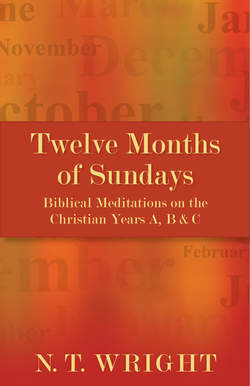Читать книгу Twelve Months of Sundays - N.T. Wright - Страница 18
На сайте Литреса книга снята с продажи.
ОглавлениеThe Second Sunday of Epiphany
Isaiah 49.1–7
1 Corinthians 1.1–9
John 1.29–42
Our question to Isaiah is always, ‘Who is the Servant?’ Israel, replies the prophet (Isaiah 49.3). But the far harder question is, ‘Who is Israel?’
To this, Isaiah gives three concentric answers. The nation as a whole, the people abhorred by the nations (v. 7). Those whose task it is to raise up the tribes of Jacob, and to restore the survivors of Israel (v. 6). And also one who stands over against both nation and remnant (50.10: the remnant are those ‘who hear the voice of the servant’). Nation, remnant, individual form a lasting pattern.
As Christians we want to add: Jesus, naturally; and the apostles (Paul often uses Isaianic servant-language to describe his own work). Worryingly, the New Testament also adds: ‘ordinary’ Christians (not that there are any such, but you know what I mean). We can’t get off the hook of the demanding servant-vocation by supposing Jesus has done it all. The Isaianic pattern still awaits fulfilment: if God’s justice and salvation are to reach to earth’s bounds, it will be through servants, equipped with the spirit of the Servant.
This is the basis of Paul’s appeal to Corinth. Before he launches into the letter’s many problems, he lays down a foundation. God’s people in Corinth are summoned to be saints and worshippers (v. 2); great grace has been poured out on them (v. 4); God has given them many gifts of speech and knowledge (vv. 5–7). God is faithful, and will now give them strength (vv. 8–9). They belong to the koinonia the partnership, of God’s Son, King Jesus, the Lord (v. 9).
But that partnership is not just a dining club where one can settle down and enjoy fellowship. It is a business partnership with a purpose: to address the sin and pain of the world with the love of God unveiled on the cross. Paul is about to call the Corinthian church to model and implement the genuine new humanity through which alone God will overturn the wisdom and power of the world. This is the servant-vocation, first-century style. It remains the servant-vocation still.
The fluidity of Isaiah’s servant-concept therefore has nothing to do with the prophet’s being unable to make up his mind or to bring the picture into clear focus. It has to do with God’s continuing determination to work through his created order, through his chosen people. Through Jesus, yes, as the true Israelite, the firstborn of all creation, but also now through those who belong to Jesus; lest, salvation having been accomplished in Jesus, the world and the human race be merely passive thereafter. So, in John’s account of Jesus’ baptism and the first disciples, Andrew’s announcement (‘we’ve found the Messiah!’) is matched, balanced, by Jesus’ comment (‘Simon, eh? I’m going to call you Mr Rock’). When, through the window of God’s revelation, you recognize the unique Servant, you will also glimpse your own reflection in the glass.
